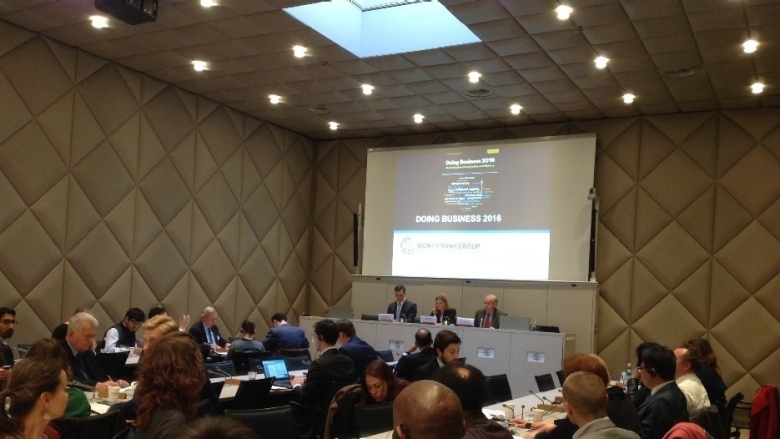On November 10, 2015, the WBG Geneva Office hosted the presentation of this year’s Doing Business Report, which focused on the topic of “Measuring Regulatory Quality and Efficiency.” The Doing Business Report provides objective measures of business regulations for local firms in 189 economies. Each year countries try to move up in the rankings in relation to their neighbors while improving the business climate for firms who do business within their territory. Augusto Lopez-Claros, World Bank Group’s Director of the Global Indicators Group, presented the Report sharing that more than 60% of the world’s economies improved their business rules in past year, and that majority of the new reforms were designed to improve the efficiency of regulations, by reducing their cost and complexity, with the largest number of improvements made in the area of 'starting a business.
“There is persuasive research that shows how efficiency and quality of business regulations go hand-in-hand with producing more competitive, viable companies and firms that help to grow national economies. The increased emphasis on the quality of regulation, to complement the previous focus on efficiency, is aimed at providing greater clarity between well-designed and badly-designed regulations, making it easier to identify where regulation is enabling businesses to thrive and where it has the opposite effect,” explained Augusto Lopez-Claros.
He also shared insights on what the 'top improvers' did to ameliorate their business environments. The world’s top 10 improvers, i.e. economies that implemented at least three reforms during the past year and moved up the rankings scale, are Costa Rica, Uganda, Kenya, Cyprus, Mauritania, Uzbekistan, Kazakhstan, Jamaica, Senegal, and Benin. As such, the participants of the event benefited from the presence and remarks given by H.E. Ambassador Álvaro Cedeño Molinari, Permanent Representative of Costa Rica to WTO, who spoke about the reforms his government undertook and how this has impacted the country's competitiveness.
In the global ranking stakes, Singapore retains its top spot. Joining it on the list of the top 10 economies with the most business-friendly regulatory environments are New Zealand, in second place; Denmark (3); Republic of Korea (4); Hong Kong SAR, China (5); United Kingdom (6); United States (7); Sweden (8); Norway (9); and Finland (10).
The meeting ended with a lively discussion with the audience, with lots of questions about the report and it’s main findings.
